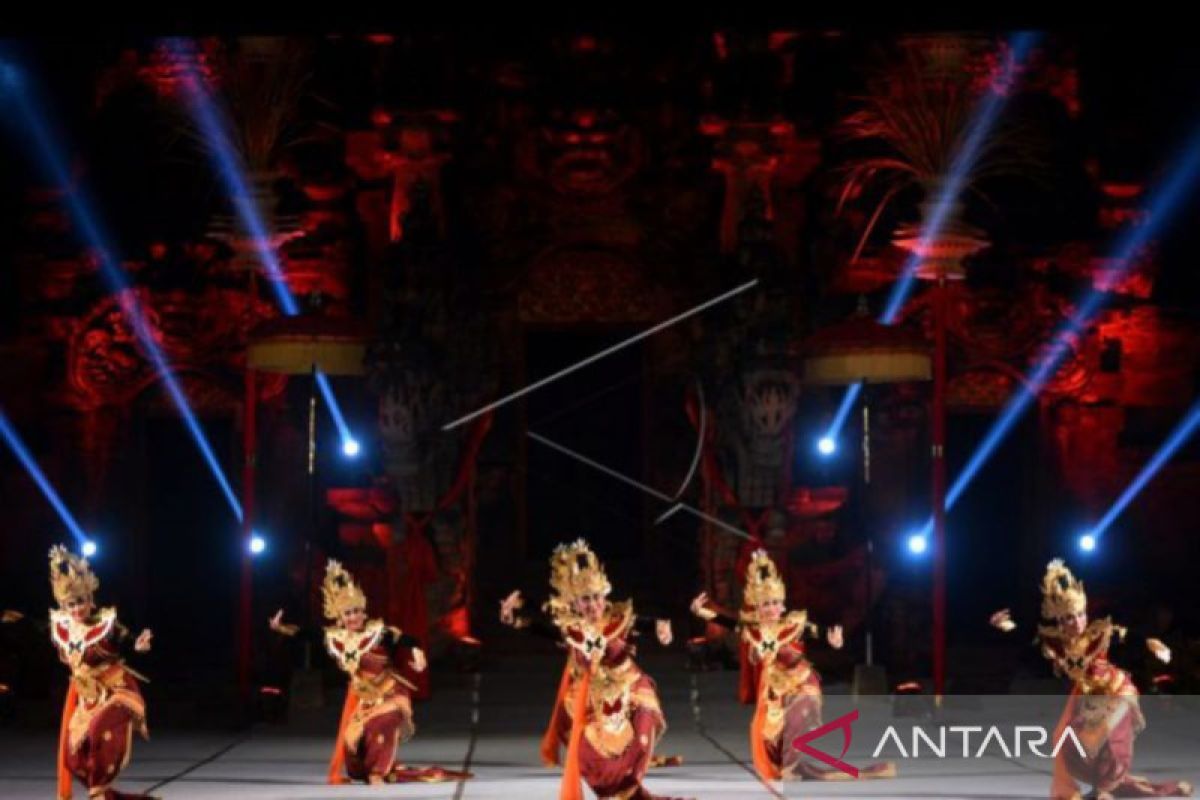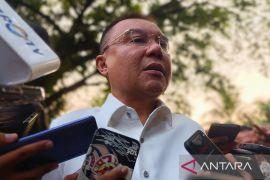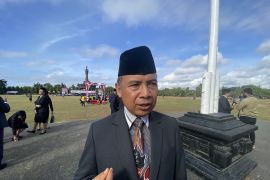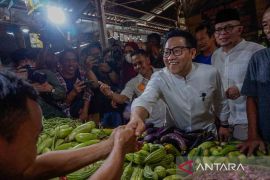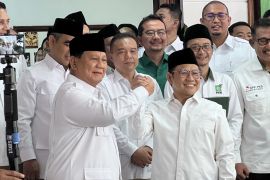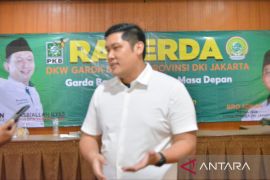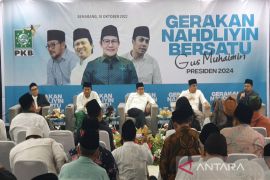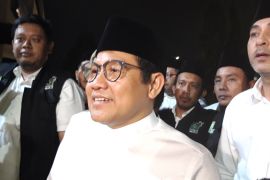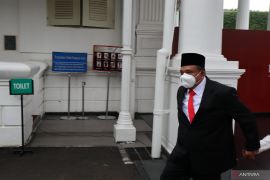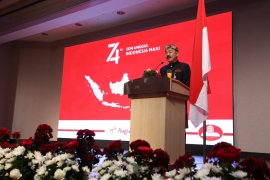In addition to (visiting) the festivals, tourists can visit the GWK (Garuda Wisnu Kencana Cultural Park), Tanah Lot (Temple), Besakih Temple, Ulundanu Temple, Ubud (Village), Sanur Beach, Penglipuran Traditional Village and other tourism destinationsDenpasar, Bali (ANTARA) - The melodious sound of traditional musical instrument and the cheers of thousands of spectators filled the Bali Provincial Cultural Park in Denpasar City, thereby announcing that the Bali Arts Festival (PKB) had returned.
The biggest art festival held by the Bali provincial government since 1978 was not implemented in 2020 due to the COVID-19 pandemic. Later, it was conducted both through online and offline means in 2021.
Meanwhile, in 2022, the local community as well as foreign and domestic tourists are allowed to attend and enjoy the festival in person.
Various outstanding cultural performances presented can be watched for free at the month-long festival to be held from June 12 to July 10, 2022.
While opening the 44th edition of the festival, Home Affairs Minister Muhammad Tito Karnavian lauded the attempt of the Bali provincial government to hold the festival despite the COVID-19 pandemic being far from over.
The decision to implement the event was taken on account of the fact that the number of additional daily cases of COVID-19 had decreased and the booster vaccination coverage in the province had reached 57.51 percent, according to the Health Ministry’s website as of July 4, 2022.
Thus, the province has the highest booster vaccination coverage in Indonesia.
Hence, the audience can watch the various cultural performances safely and comfortably.
The event began with a parade, locally called "peed aya," which involved at least 2,400 artists and was witnessed by thousands of spectators on June 12, 2022.
The parade's participants do not only come from the nine districts and cities in Bali Province but also came from universities, schools, banks, and the private sector.
The 44th PKB is themed "Danu Kerthi: Huluning Amreta" that embodies the spirit of preserving water as a source of life.
In addition to the parade, other activities included in the festival, comprise performance (rekasadana), competition (wimbakara), exhibition (kandarupa), workshop (kriyaloka), gathering (widyatula), and cultural award (adi sewaka nugraha).
A total of 16,150 artists and 200 dance studios, social organizations (sekaa), and art communities will be involved throughout the festival.
The artists will not only come from various regions in Bali Province but also from Yogyakarta, Papua, North Sumatra, West Nusa Tenggara, and Jakarta.
The 44th PKB will showcase several gong kebyar (Balinese traditional music with dynamic tempo and rhythm) performances from various dance studios.
For instance, Gong Kebyar Gladag from Denpasar City will perform along with Gong Kebyar Pinda Gianyar; Gong Kebyar Perean Kangin from Tabanan District along with Gong Kebyar Peliatan from Gianyar District; as well as Gong Kebyar Sibang Gede from Badung District along with the Denpasar City Indonesian Arts Institute.
Meanwhile, the competition was held for various participant groups, including kids, teenagers, male adults, and general adults.
The competition included baleganjur (Balinese traditional "gamelan" musical instrument set) performance contest, barong ket (Balinese traditional dance) performance contest, traditional Balinese attire contest, and classical wayang (puppet) painting contest.
Moreover, news article writing competition for journalists as well as opinion writing contest are available for the public during the implementation of the 2022 PKB .
Furthermore, in line with the people’s spirit to revive Bali’s economy, the Rising Balinese Small and Medium Industry (IKM) Exhibition, coordinated by the Bali Provincial Regional National Crafts Council (Dekranasda), is implemented amid the 44th PKB.
The exhibition, which has been held since 2021, featured various collections of endek and songket (Balinese woven fabrics); clothes made from endek and songket; kebaya (traditional women’s attire); tie-dye clothing; gold and silver jewellery; handicrafts made from bamboo, rattan, and coconut shells; “kamasan” puppet paintings; as well as furniture.
Apart from the IKM exhibition, there is also the two-dimensional and three-dimensional art exhibition showcasing various brilliant arts selected meticulously by the curators.
The 2022 PKB was also held concurrently with two other cultural arts events: the Bali World Cultural Celebrations (BWCC) that was implemented on June 12-25, 2022, and the Balinese Tradition Jantra (Wheel) that was held from June 20 to July 6, 2022.
Related news: Hope Miss Global event will promote Balinese culture: Dekranasda head
Head of the Bali Provincial Tourism Office Tjok Bagus Pemayun noted that seven cultural festivals will be held in Bali Province throughout 2022.
In addition to the PKB, the festivals include the Bali Spirit Festival in Gianyar District (May 29 to June 10, 2022), Ubud Village Jazz Festival in Gianyar District (August 12-13, 2022), and Sanur Village Festival in Denpasar City (August 19-21, 2022).
Furthermore, the other festivals are Pemuteran Bay Festival in Buleleng District (November 11-13, 2022), Denpasar Festival in Denpasar City (late November to December 24, 2022), as well as Penglipuran Village Festival in Bangli District (December 7-10, 2022).
"In addition to (visiting) the festivals, tourists can visit the GWK (Garuda Wisnu Kencana Cultural Park), Tanah Lot (Temple), Besakih Temple, Ulundanu Temple, Ubud (Village), Sanur Beach, Penglipuran Traditional Village, and other tourism destinations," the office head remarked.
A tourism observer from Bali Province’s state-run Udayana University, Nyoman Sunarta, emphasized that the provincial government should develop sustainable tourism, which is a combination of natural, cultural, as well as other unique potentials of Bali.
He stated that the development of sustainable tourism depends on the implementation of the "Proud of Bali" Program as the directives to improve the tourism sector.
In addition, it is necessary to improve the banjar (cultural villages) to expedite tourism development with the three principles of back to nature, back to basic, and back to tradition.
According to the three principles, tourism development should highlight the natural beauty, specialty, and culture of Bali.
Hence, development of the tourism sector in the province should revive the local tradition. This can be achieved when tourism players exclusively serve Balinese native culinary dishes rather than foreign dishes at hotels.
Related news: Local wisdom highlighted in drafting Bali Province Bill: Minister
Editor: Rahmad Nasution
Copyright © ANTARA 2022
